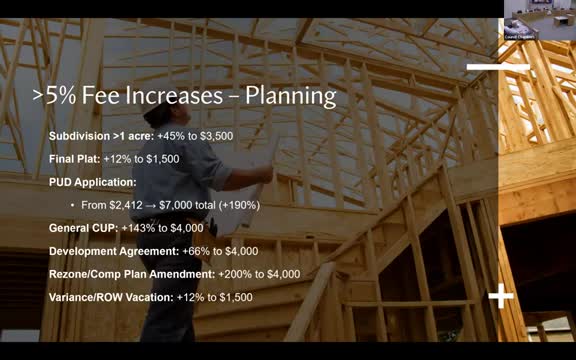City Council Approves 143% Increase in Planning Fees for Subdivision Applications
August 02, 2025 | Sandpoint, Bonner County, Idaho
This article was created by AI summarizing key points discussed. AI makes mistakes, so for full details and context, please refer to the video of the full meeting. Please report any errors so we can fix them. Report an error »

The City of Sandpoint held a special council meeting on July 30, 2025, to discuss significant updates to the planning fee structure and the implications for local development. The meeting focused on the adjustments made to various fees associated with conditional use permits (CUPs), development agreements, and rezoning applications.
The council proposed a substantial increase of 143% for general CUP applications, reflecting the extensive effort required for processing these permits. Development agreement fees were also raised to better align with the staff and legal resources needed for their management. Additionally, the council acknowledged that the previous fee schedule did not accurately represent the workload involved in rezoning and comprehensive plan amendments.
Councilman Trevor raised a question regarding the number of lots greater than one acre being processed, clarifying that the fee adjustments primarily pertain to larger subdivisions. The discussion highlighted the complexity of subdivisions, which include various smaller-scale processes such as short plots and lot line adjustments.
Another council member, Jason, inquired about the possibility of implementing a fee structure that includes actual review costs, similar to practices in other jurisdictions. This suggestion prompted a discussion about the feasibility of tracking staff hours and the potential for additional costs beyond the set fees.
The planning department's budget was also a focal point of the meeting. It was noted that the fees generated from development activities would not cover the full operational costs of the planning department. The city operates under a model that promotes economic development and community growth, suggesting that taxpayer support is essential for maintaining these services. The council emphasized that the benefits of planning efforts extend beyond developers to the entire community, as they contribute to housing and job creation.
The meeting concluded with a consensus that while the new fee structure would improve cost recovery for development review, it would not fully offset the planning department's expenses. The council acknowledged the ongoing need for taxpayer investment in city planning to support broader community goals.
The council proposed a substantial increase of 143% for general CUP applications, reflecting the extensive effort required for processing these permits. Development agreement fees were also raised to better align with the staff and legal resources needed for their management. Additionally, the council acknowledged that the previous fee schedule did not accurately represent the workload involved in rezoning and comprehensive plan amendments.
Councilman Trevor raised a question regarding the number of lots greater than one acre being processed, clarifying that the fee adjustments primarily pertain to larger subdivisions. The discussion highlighted the complexity of subdivisions, which include various smaller-scale processes such as short plots and lot line adjustments.
Another council member, Jason, inquired about the possibility of implementing a fee structure that includes actual review costs, similar to practices in other jurisdictions. This suggestion prompted a discussion about the feasibility of tracking staff hours and the potential for additional costs beyond the set fees.
The planning department's budget was also a focal point of the meeting. It was noted that the fees generated from development activities would not cover the full operational costs of the planning department. The city operates under a model that promotes economic development and community growth, suggesting that taxpayer support is essential for maintaining these services. The council emphasized that the benefits of planning efforts extend beyond developers to the entire community, as they contribute to housing and job creation.
The meeting concluded with a consensus that while the new fee structure would improve cost recovery for development review, it would not fully offset the planning department's expenses. The council acknowledged the ongoing need for taxpayer investment in city planning to support broader community goals.
View full meeting
This article is based on a recent meeting—watch the full video and explore the complete transcript for deeper insights into the discussion.
View full meeting